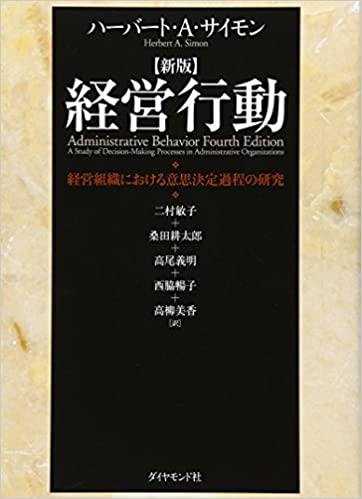- Published on
[Simon] Pursuing rationality in the social system and not being fooled by the media
Roughly speaking
- The final episode of "Reason in Human Activity." Hats off to Simon's defensive range.
- Overcoming human rationality through social systems.
- Beware of information biases brought about by media and expertise.
Reason in Human Activity
This is the third (final) episode of "Reason in Human Activity" by Herbert-Simon, a giant of economics.
Translator Yamagata Hiroo himself has already written a summary, so if you can get a more rough understanding, please refer to the following.
Herbert A. Simon, Reason in Human Activity, Anchoco
The first presentation was made up of four models of rationality.
Herbert Simon How humans can make rational choices? (Reason in Human Affairs)
Among the superhuman models, behavioral models, intuition models, and evolutionary adaptation models, it pointed out that economics is biased towards superhuman models and is not realistic.
We present a fourth evolutionary adaptation model as a realistic rationality model, and this is the second installment.
Simon Strange similarities between evolutionary theory and corporate pursuit of rationality
This time, we will explain how social systems work to overcome human rationality, and how humans are influenced by social systems. Of the three explanations, this will be the most familiar topic.
Overcoming limited rationality through social systems
People live in groups, not individuals. Therefore, if we live completely selfishly and without rules, the entire human group falls into a state that is far from rationality.
For example, if a high-rise apartment stands in front of your room in good sunlight and the sunlight becomes poor, the value of your room will be degraded. For this reason, social systems, for example, limit the locations where higher floors are built, and limit the color of the building.
On a global scale, the social inequity that places of birth brings is extraordinary. The United Nations is actively tackling the issue of inequality as much as possible.
These factors of unexpected fluctuations in value that are out of control by humans are called externalities. Externality is the very existence that defines human rationality, and there is a social system to improve its rationality.
However, there are limitations to the social system itself. There are limits to interest, diverse values, and uncertainty.
The limits of interest refer to the systemic ability to address the issue of interest in one topic at a time. Steady-state public services can be carried out in parallel. For example, fire and police can operate in parallel. However, we can only deal with non-stationary issues, such as diplomatic issues and economic policy issues, one at a time.
Diverse values refer to the fact that, in the end, the level of satisfaction that can only be achieved by people is different, so only social welfare that is somewhat satisfying can be achieved. Somewhere, individuals have no choice but to fulfill their own wishes. American Dream.
Uncertainty refers to the lack of knowing which options actually raise the level of rationality. Whether it is better to raise the benefits directly to the travel industry or whether GOTO Travel's stimulus package is better will need to be determined based on the COVID-19 situation and the travel industry's internal reserves, but the probability cannot be strictly considered. It is necessary to allow some uncertainty before deciding on the name Eiya.
There are typical support tools for solving limited rationality in social systems. It is a specialized organization and market mechanism, trial procedures, and AI and computer support tools. Both support limited rationality from various points.
Media and Expert Influence
Although appropriate information is required for social systems to produce limited rationality, today there is a challenge for the media and experts. Only garbage can be produced from garbage information.
The first is the media. The media is biased to provide information that is in their own interest. Typical media is a desire to convey Biden's victory. Opinion polls and other media have also made a huge difference.
The second is experts. Experts usually support limited rationality, but their own beliefs and experts' own limited rationality do not necessarily lead to the best results. Rather, it can become power and have negative effects. The current Science Council of Japan may be considered a typical example of corruption.
Conclusion
Reason is a tool that improves human rationality, but rationality itself does not know the answer. We need to realize that it is impossible to reach an absolute optimal solution. But there's no need to be pessimistic. If we recognize the limited rationality of humans and continue to seek satisfactory rationalization with appropriate information, we can generally reach a level of satisfaction. Fortunately, humans are beginning to be able to raise levels of satisfaction by using tools such as social institutions, computers and intuition.


